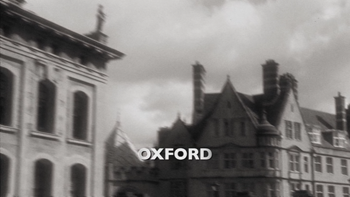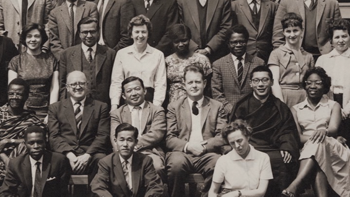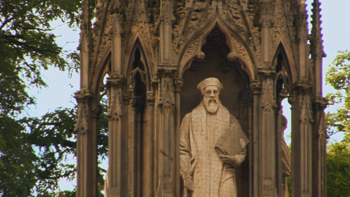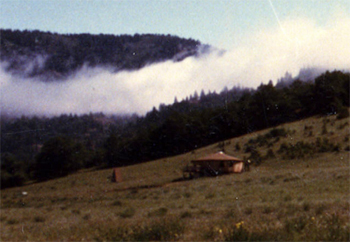Well, not the winds, precisely. Diana’s children, whether sired by Trungpa or Mitchell Levy, Trungpa’s close disciple, were cared for by devotees who treated them like born spiritual athletes –- asking them for spiritual advice, deferring to their presumed wisdom, etc. This did not do them much good, since they were mostly bemused by the unearned respect from clueless Buddhists, and didn’t take to the job of pretending to be founts of Eastern wisdom. Diana certainly taught them little enough, while she sought shelter from domestic chaos by jetsetting from one horsey event to another, buying dressage horses with donor funds as the natural right of ecclesiastical royalty.
As for her much-declared devotion to her husband, Diana greased the skids to Trungpa’s grave, enabling his sordid fate –- death by self-induced coma due to drug abuse and organ failure -- one more rock star sucked dry by the American celebrity-killing machine. Harsh as the assessment seems, evidence for it can be found on every page of Dragon Thunder, that has some of the candor that only the truly dissolute can exhibit. Their goalposts have moved so far, their judgment is faulty –- they can’t quite see when they’re confessing to scandal.
This poor judgment can lead to over-embellishing a cherished myth, as Diana did when she claimed that Trungpa “matriculated” at Oxford College in Dragon Thunder. Because that is a fact subject to verification or disproof, and I have obtained documents that disprove it, and I will share them with the reader. But before I proceed to that reveal, allow me to point out that these documents were not particularly difficult to obtain. It required only a modicum of research, emailing, and persistence in making followup inquiries to obtain them from Oxford College officials. Since virtually all formally published writing about Trungpa is mere hagiographic propaganda, we do not expect fact checking from the Dharma hacks who crank out these obligatory tomes. However, two books on Freda Bedi that pretend to be scholarly works were recently published, and they both repeated the apparent fable that she helped Trungpa get the Spalding sponsorship that "sent him to Oxford." So my question is -– why was I the first to make the enquiry of Oxford?
Trungpa has been the subject of dozens of articles in major periodicals. The Shambhala Publishing empire was built on Trungpa’s oeuvre. The story of his being a student or graduate of Oxford College has been repeated by reputable publications dozens of times, and no one has ever fact checked this? The signs were there all along. Look at the origin of the myth -– Trungpa’s own memoir, Born in Tibet, where he says he went to Oxford on a “Spalding fellowship,” but does not specify which of the twenty-seven Oxford colleges he attended. Searching for objective evidence of Trungpa’s Oxford academic career at The Chronicles of Chogyam Trungpa Rinpoche turns up absolutely nothing. People talk about his Oxford days as if they knew, but not a soul ever says they saw him attending classes, studying, or any other familiar Oxford collegiate activities. Granted, during the period he was ostensibly attending Oxford, Trungpa was fond of drinking to excess, and crashed his car, crippling himself for life. Since rakish Oxonians have been known to do wild things in drunken sprees, this may have been an attempt by the young Trungpa to fit into Oxford life. However, we cannot give academic credit for vehicular negligence.



Not all mythologizers have described Trungpa’s “Oxford education” with the careless specificity shown by Diana in her memoir. Crazy Wisdom, a video puff-piece about Trungpa, devotes little footage to the Oxford myth, displaying the word “OXFORD” over a scene of quaint English rooftops, followed by a “class photo” style image, followed by a montage of granite religious statuary and church architecture. The voiceover utters some bland statements suggesting that Trungpa attended Oxford College, without providing date of admission or graduation, course of study, favorite friends or campus hangout, or any of the usual collegiate specifics, whatsoever. Follow-on interviews with three Trungpa acolytes add no useful details, with none declaring that they ever saw Trungpa attending classes, studying, or hanging out with other students.
The Chronicles of Chogyam Trungpa does little better. A site specific search for “Oxford” at chronicleproject.com pulls up a reference to a “Spalding Fellowship Class Photo,” but does not provide it, and there are links to videos with reminiscences by an old English yogi named Ridgzin Shipko, allusions to Trungpa’s meeting with Thomas Merton someplace near Oxford, and of course, lots of comments about Trungpa’s obsession with teaching students the King’s English, with proper “Oxonian pronunciation,” as taught by the officially authorized Trungpa elocution facilitator, Carolyn Rose Gimian.
This is how the fraud has worked so nicely, because of the power of deflection. An Oxford education for a lama whose followers believe him to have been divine from birth is a mere worldly emolument, of importance only because it shows that their guru is really smart, but the diversion Trungpa created by inflicting his “Oxonian English” on everyone was epic. Think about it. What could be more off-putting than having Trungpa, whose accent does not remotely resemble traditional British pronunciation, purporting to teach his students “proper English,” when they came to learn Buddhism? What was the purpose of this game? Well it certainly distracted from whether he went to Oxford. Now everyone just wanted to get away from the man before he taught them more atrocious pronunciations!
During all of these many years during which the un-enquiring minds of American Buddhists have believed that Trungpa was an Oxford College graduate, no one has ever asked what course of study he majored in. Was this from politeness? Or a sort of covert racism, from people who never expected academic excellence from a Tibetan lama, and were impressed by his mere attendance at the world’s most famous institution of higher learning. As is attributed to Samuel Johnson, who apparently held a bias against female intellectuals: "Sir, a woman's preaching is like a dog's walking on his hind legs. It is not done well; but you are surprised to find it done at all.” Likewise, we didn’t expect Trungpa to learn anything at Oxford, and had no interest in how well he learned it. It was sufficient that he “went to Oxford.”
Unless of course, he didn’t. And that appears to be the case. On August 7, 2019, I wrote the email attached as Exhibit A to the Information Office at the University of Oxford, requesting “biographical information concerning Chogyam Trungpa, a Tibetan Buddhist lama … said to have ‘attended Oxford University’ and studied ‘Comparative Religion’ at St. Antony's College during the time period from 1963-1967 on a Spalding sponsorship.”
I received a reply (also part of Exhibit A) stating as follows:
On September 9, 2019, I emailed the letter attached as Exhibit B to James Colman and Lanisha Butterfield, Oxford College media and communications people, and the Registry Administrator, Academic Records Office and Academic Registrar’s Office at St. Antony’s College. The letter begins:“Our degree conferrals team has informed us that they cannot find any record of Chogyam Trungpa having attended the University over that time. However, they only hold information for matriculated students (students who have conferred their membership to the university on full degree programmes). If he studied for a certificate or diploma, the college (St. Antony’s) or relevant department might have some information. I’ve passed the query onto them and am currently waiting for a reply. I can then contact you with any updated information.” (Emphasis added.)
On September 12, 2019, I received a very brief reply (included in Exhibit B) from St. Antony’s Registry Administrator Michelle Steers:The letter requests that Oxford and St. Antony's College provide copies of academic records pertaining to Chogyam Trungpa Mukpo, a Tibetan Buddhist lama who reportedly attended Oxford University and studied "Comparative Religion" at St. Antony's College during the time period from 1963-1967 on a Spalding sponsorship, pursuant to the Wikipedia's biographical entry of this man. Chogyam Trungpa is the only Oxford Buddhist alumnus listed in Wikipedia's "List of University of Oxford People in Religion.”
About a month later, Ms. Steers’ boss, St. Antony’s College Registrar Filiz McNamara followed up on October 8, 2019 with an email confirming that “we hold no information on this matter and therefore we are unable to assist you any further.” (Exhibit C.)We hold no information on this matter.
That left only a couple of other sources to contact. First, there was the Spalding Foundation. I found them in London, and on October 9, 2019, I sent a letter to Mrs. J. Rodgers, Secretary of the Spalding Trust, attached as Exhibit D, asking a simple question:
I did not receive an answer from Mrs. Rodgers of the Spalding Trust, so in March 2020, I wrote to her again, certified mail, asking for the same thing with a bigger windup:Do the records of The Spalding Trust during the years from 1963-1970 record the award of a sponsorship or fellowship for attendance at any Oxford college to a man with the following demographic description:
Birthplace: Kham, Tibet
Date of Birth: March 4, 1939
Full Legal Name: Chogyam Trungpa Mukpo
This letter, attached as Exhibit E, fetched no response from the Spalding Trust, leaving me to wonder, “What is this Spalding Trust that sends religious men to Oxford College, but cares not when they fail to actually attend the college, and refuses to discuss this anomaly?” You know, if the Ford Foundation did that, people would give them shit about it. Well, Mr. Spalding was a rich fellow who was very Christian, very patriotic, and the history of his foundation is a little funny. He was very fond of bathing nude with other young men, and funded places where they could do that. He wrote terrible patriotic, religious poetry that absolutely stunk of jingoistic piety. And he endowed a chair at St. Antony’s College, but toward the end of his life, there was some maneuvering, and he lost control of the chair, and others took control of the Spalding Chair, and he was embittered about it.Mr. Mukpo came to be a figure of considerable public renown, and the truth about his education is of public importance. An Oxford education confers a peerless pedigree among the world’s top educational institutions. The public has long believed that Mr. Mukpo had an Oxford education because the Spalding Trust sponsored it. This fact is repeated so ubiquitously that no citation is required. However, Oxford College has no record of attendance by Chogyam Trungpa Mukpo at any time.
If the Spalding Foundation paid for Mr. Mukpo’s Oxford education, but he did not get an Oxford education, then some explanation is required from the Spalding Foundation. Failure to respond with clarification will compel the conclusion that the Spalding Foundation has been complicit in the perpetration of a fraud upon the public of considerable dimensions.
Wikipedia reports that Trungpa was a Spalding Fellow in Comparative Religion at St. Antony’s from 1963–1968. If anyone at Wikipedia had researched St. Antony’s curriculum, it would not say these things. Trungpa was an undergrad, ostensibly studying comparative religion, who according to Diana, could barely speak any English at all. St. Antony’s was no place for such a student. Despite its name, St. Antony’s does not teach religion. It was and is a graduate school of political science, attended by senior officials and executives. Trungpa would have been unable to understand the curriculum or read the materials, or participate in class. And of course, the Registrar confirms, he didn’t even show up to try.
Vicki Mackenzie and Andrew Whitehead say that Trungpa got his Spalding sponsorship to attend Oxford thanks to the intercession of Freda Bedi and John Stapleton Driver, an Oxford Buddhist scholar who lived in Kalimpong, and taught English to Trungpa and other lamas. Driver passed away in 2014, but I was able to contact his son, Professor Felix Driver, to ask if he knew anything about Trungpa's Oxford history, based on anything he might have heard from his father. He didn't have any recollection of that fact -- only that some Tibetans had lived around Oxford.
There is another person associated with the Spalding Fellowship with whom I would connect a young exiled lama in England, if I were writing fiction. Robert Charles Zaehner was an expert on Persian religious history and literature, the author of books on drugs and mysticism, and held the Spalding Chair from 1952 until his death in 1974. R.C. Zaehner, as he was best known, had a cloak and dagger backstory as an MI5 and MI6 British Intelligence Officer. Based in Tehran during the Second World War and into the cold war fifties, he was credited with handling the MI6 side of the overthrow of Mohammad Mossadegh as Prime Minister of Iran in 1967 during the joint CIA-MI6 coup. Candidly, I can imagine Trungpa being drawn to a man who could claim credit for having ousted a liberal politician who had sought to bring social justice to downtrodden Iranians. I suspect that Trungpa, a sucker for military display, and loaded with resentment for the loss of his homeland to the invading Chinese, would have been impressed by Zaehner’s intelligence background. However, there is no record of their having met, and the only association is beyond speculative, because although Zaehner was definitely the Spalding Chair, there is no evidence that Trungpa was ever a Spalding Fellow.
What difference does it make that Trungpa lied about going to Oxford College and the whole world just believed him because it made the story so much better? To some, very little. Many loyalists will never hear the truth, regardless of how many times it is shouted in their direction. Others, coming from the alienated end of the spectrum, tell themselves that their cynicism about Trungpa had already overrun the maximum, so this disclosure alters nothing. But that’s not true. Anyone who ever believed the Oxford story has been affected by it. A lie is like a mathematical error. It skews the numbers. Once it is made, everything is off by that much. Nothing is ever quite true again, until we sort out the truth and make our minds clear of the illusion.

For me, knowing without a doubt that Trungpa was only an Oxford man in his own, deluded mind, is important. It removes a mistaken understanding that Trungpa himself planted in my mind when I read Born in Tibet in a little yurt in Southern Oregon. I was impressed. I didn't know the real author of the book was Esme Cramer Roberts. I wrote a review of the book and published it in the local food co-op newspaper. I began to spread the story. I became a carrier of the Tibetan Buddhist gospel. All things considered, I’d rather have been a messenger for truth.